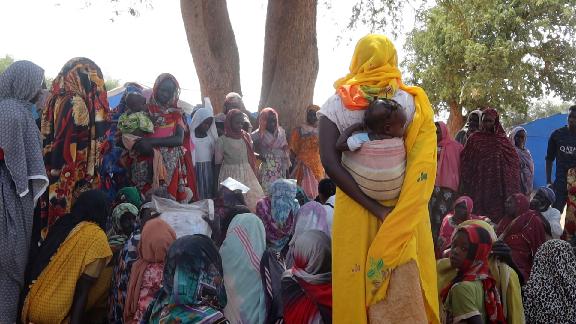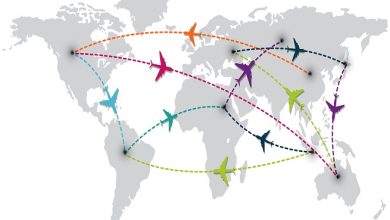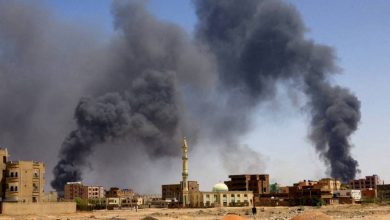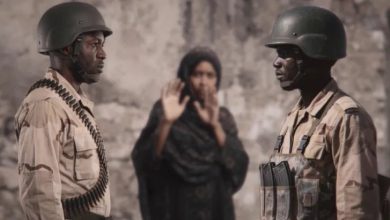Reports
Arab fighters killed Babies, boys and men in war on Sudan tribe :special report (1-2)

Agencies – Sudan Events
The Arab militiamen were hunting for boys that day. That’s how they found 2-year-old Ibrahim Saleh.
Ibrahim, his baby sister and their mother, Safaa Abdel Karim, were on the run in June, fleeing a weeks-long massacre in the Sudanese city of El Geneina. Arab militiamen had shot, stabbed and burned to death members of their tribe, the darker-skinned Masalit people.
Abdel Karim’s husband was among the dead. Along with dozens of women and children, she and her kids were trying to make it to safety in neighboring Chad. They almost did.
About 10 kilometers from the border, she said, Arab paramilitary forces and militiamen stopped them and ordered her to hand over Ibrahim. They looked inside his clothes to inspect his sex, then set him down and began bashing his head and body with wooden rods.
Safaa Abdel Karim, speaking in a refugee camp in Chad, said her two-year-old son was beaten to death by RSF and Arab militia forces as she fled a massacre earlier this year. “They said if the boy grows up, he will fight us,” she recalls the men shouting.
“He was crying, mama, mama,” Abdel Karim said. When she tried to rescue him, one of the men shot her below the shoulder, she said, leaving a scar from the wound. “I kept screaming to leave my son. Don’t kill my son.”
The men kept striking Ibrahim. “You zurga won’t stay in El Geneina,” the men shouted, using a racist term for darker-skinned people like the Masalit. “They said if the boy grows up, he will fight us.”
Bleeding from her wound and with her daughter in her arms, Abdel Karim said she kept trying to stop the attack on Ibrahim. But the men continued beating him until he lay dead.
Abdel Karim was one of more than 40 mothers who described to Reuters how their children, mostly boys, were killed by Sudan’s Rapid Support Forces (RSF) paramilitary and its allied Arab militias during an ethnically targeted killing campaign this year in and around the West Darfur capital of El Geneina.
Her son and the other children were all part of the Masalit tribe, which was a majority in El Geneina until the RSF and Arab militias forced them out. Around half a million people, mostly Masalit, have left for Chad as a result of the violence.
Thousands have died in the attacks. The dead include women and girls. Masalit women also have described enduring sexual assault at the hands of the Arab-dominated RSF and its allies, as Reuters detailed last month.
But in the killing sprees, witnesses say, Arab forces have specifically targeted males for death, from infants to adults.
Thirty-six of the mothers told Reuters their children were shot from close range, 33 of them boys and eight girls. Six of the mothers said they watched as their children, some as young as six months old, were beaten to death by RSF and Arab militia fighters. Five of the six children killed this way were boys.
The killers used knives, too: Ten people who escaped to Chad told Reuters they saw children having their throats slit. All were boys.
Most of these children were killed as they fled with their mothers from El Geneina. En route to Chad, five survivors described seeing militiamen stop women with babies, check the child’s sex, and kill it if it turned out to be a boy.
Masalit men were also hunted down by the RSF and its allies. In the most recent round of violence in El Geneina in early November, Reuters revealed that hundreds of young Masalit men were rounded up and taken to various locations in the city where eyewitnesses said some of them were executed.
More than 30 women interviewed for this report said their husbands, brothers or fathers were killed or went missing in this year’s attacks. Several women said they hid their brothers or smuggled them out of El Geneina for fear they would be targeted. Dozens of men recounted how they cut through valleys and traveled along remote routes to Chad to evade checkpoints set up by the RSF and Arab militias.
Five survivors told Reuters they saw militiamen stop women with babies, check the child’s sex, and kill it if it turned out to be a boy.
Reuters was unable to independently corroborate the details of some accounts. In some cases, friends and neighbors confirmed elements of the survivors’ stories. Common patterns also emerged from the descriptions of the violence given by survivors. For some people, Reuters was able to review registration cards issued for refugees by the United Nations.
U.N. workers in Chad have so far collected demographic data on more than a quarter of the 484,000 refugees who have fled Sudan this year and now reside in camps along the border. Based on this data, the U.N. estimates nearly twice as many adult females as males have crossed the border. Despite the targeting of males, the gap is less pronounced among children, where there is almost parity between the number of boys and girls.
Several mothers of slain children, as well as other witnesses, said the militiamen made clear why they were targeting Masalit boys: They wanted to be sure the children wouldn’t grow up to be fighters and one day seek revenge for the attacks on the Masalit.
Aziza Adam Mohammed, 28, said her six-month-old son was shot and killed on June 14 as they fled to Chad with a group of other refugees. When Arab militiamen confronted the group, she said, “They shouted: Shoot, shoot the boys.”
“I heard them saying that the boys will grow up and they will kill us,” she said. “So we must destroy them now.”
A Trail of Blood and Fear
Ana Scattone, an emergency protection officer at the United Nations High Commissioner for Refugees in the Chadian border town of Adre, said the targeting of males also has a more far-reaching goal. “The objective of the killings seems to be the elimination of future fighters as well as the line of ancestry of a specific ethnic group,” Scattone said.



